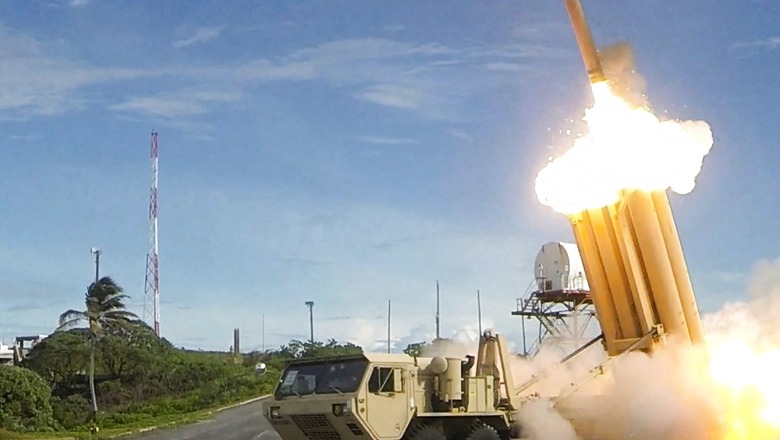
views
A report by global policy think tank Rand Corporation said that US’ five main allies in Asia ? Japan, South Korea, Australia, Thailand and the Philippines ? are unlikely to agree to host US’ ground-based intermediate-range missiles.
The intermediate-range missiles are central to US strategy to infiltrate China’s defenses if it invades Taiwan in near future.
Senior political scientist Jeffrey Hornung who authored the paper pointed out that there is a small chance that Australia and Japan could host the ground-based intermediate-range missiles (GBIRMs), while adding that neither the Philippines or Thailand would give a nod to such an arrangement.
It also points out that the US, once bound by the Intermediate-Range Nuclear Forces (INF) Treaty, does not have any GBIRMs in its arsenal compared to 1,250 ground-based intermediate-range missiles that Beijing has.
Though former US president Donald Trump’s withdrawal from the treaty ensures that there is scope to develop them.
The US perceives that ground-based weapons will be crucial in breaking through China?s defense systems and also to reverse China’s A2/AD capabilities.
A2/AD refers to the Chinese People Liberation Army’s (PLA) strategy of combining ships, missiles and sensors to prevent adversaries from approaching China’s shores.
‘The Three Nos’ and Seoul’s Reluctance
The US installed the Terminal High Altitude Area Defense (THAAD) system in South Korea in 2016 to help it thwart North Korea’s ballistic and nuclear threat.
This was not targeted towards China but that year China imposed economic measures sending a strong message to the then-South Korean president Moon Jae-in.
Moon and his government decided on a policy of three nos which forbid Korea from ? deploying additional THAAD systems, participating in a US-led missile defense system and joining a trilateral alliance with the United States and Japan.
Though Yoon Suk-yeol has indicated his willingness to walk back on the three-no’s and demanded another THAAD system, lawmakers in Seoul would know that such a move would ‘ draw an even harsher response from Beijing’, the report said.
Slim Chances In Tokyo And Canberra
The US Congress plan suggests that to effectively thwart China in the Taiwan Strait, it would need the GBIRMs to be stationed ‘ along the first island chain’, referring to the islands that span the Japanese mainland, Okinawa, Taiwan and the Philippines.
If it becomes tough to pursue this plan, Australia can offer some respite as its growing tensions with China over trade and regional security, Canberra might no longer see the choice of hosting GBIRMs as a challenge.
Despite this there are chances that the Australian political establishment and the citizens may raise issues with hosting foreign missiles on their soil and also disapprove of Australian forces getting involved if China invades Taiwan.
In the case of Japan, even though the Biden administration has taken steps to strengthen and repair the ties between Tokyo and Washington, there are chances that Japan could decline the request to host the missiles.
There are caveats. The Japanese people have demanded that the US reduce its footprint and deploying the GBIRMs would be the polar opposite. “Even if the United States refrained from deploying nuclear capabilities, if the Japanese public believed that such capabilities were nuclear capable or left open the door to such capabilities, it would be politically difficult to obtain local consent to host these capabilities,” the report said.
Philippines And Thailand’s Beijing Outreach
The Philippines recently saw the son of dictator Ferdinand Marcos Sr, Ferdinand ‘Bongbong’ Marcos Jr, rise to power in Manila with huge support from the electorate. He is likely to follow the footsteps of his predecessor Rodrigo Duterte, who brought Manila and Beijing closer, jeopardizing strong ties with Washington.
“I do not subscribe to the old thinking of the Cold War, where we have these spheres of influence, where we are under the Soviet Union or we are under the United States. I think that we just need to find an independent foreign policy, where we are friends with everyone,” Bongbong said, worrying Washington.
Despite being the US’ oldest regional partner, Thailand has inched closer to China following the 2019 coup.
During the tenure of Thailand prime minister Prayuth Chan-ocha, China has gained access to Sattahip Naval Base and conducted war games with them. Its suppression of democratic values is also an issue of concern for the US.
With these odds stacked against the US, these two nations will most likely deny hosting such missile systems on their soil.
(with inputs from Nikkei Asia)
Read all the Latest News here















Comments
0 comment